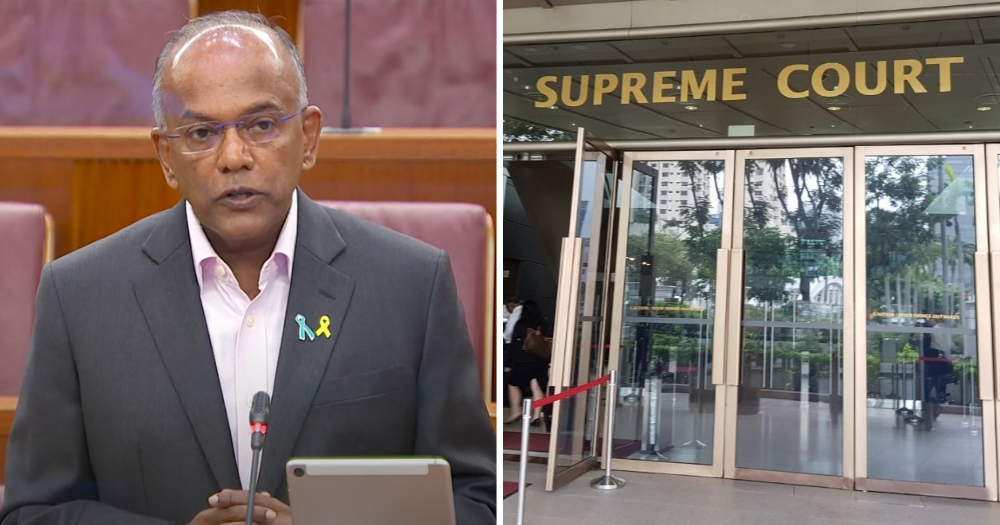Follow us on Telegram for the latest updates: https://t.me/mothershipsg
Currently in Singapore, individuals accused of committing sex crimes are publicly tried, and their verdicts are announced publicly, except for in certain circumstances where exceptions are made.
In Parliament on Monday (May 10), Nominated Member of the Parliament of Singapore Tan Yia Swam, who is a surgeon, asked Minister for Law K Shanmugam about how press reports of ongoing sex crimes are regulated, and what protection is available for medical professionals whose reputations are affected by media coverage by ongoing trials of sex crimes.
Shanmugam responded to the parliamentary question by explaining that the Ministry of Law (MinLaw) has previously assessed whether the names of accused people should be published or not, until they are convicted, and that the current position to have public trials is not set in concrete.
Considered how other countries approach it
Shanmugam explained that MinLaw has considered the two broad approaches to the issue taken by other countries.
First approach allows for anonymity to accused people in certain cases
The first approach leans toward protecting the identity of people accused of sex crimes until they are convicted, with rules which grant anonymity to the accused people in certain cases.
In Ireland, Shanmugam said, people charged with rape are granted anonymity until they are convicted, unless a judge rules otherwise.
In Switzerland, accused individuals can be granted anonymity if the court thinks that they could be exposed to "serious danger to life and limb", or other serious prejudice.
And in New Zealand and Australia, where criminal trials may be heard by a jury, the court may prohibit the identification of an accused person if it thinks that the disclosure of the identity could create a serious risk of prejudicing a fair trial.
Second approach prioritises principle of open justice
The second approach to the issue, which is practised by Singapore, Shanmugam explained, prioritises the principle of open court proceedings.
It does not give courts the general power to grant accused individuals anonymity in proceedings to protect their reputations.
This is similar in the UK, he said, where the general position is that legal proceedings should be held in public.
Exceptions and rules do exist that restrict media reporting of some criminal cases, including some restrictions on identifying accused people.
"The primary aim of those provisions is to protect vulnerable witnesses and victims, and to avoid a substantial risk of prejudicing proceedings, if such a risk exists" Shanmugam explained.
Both approaches have merits and downsides
Both of the approaches laid out have their own merits and downsides, Shanmugam said, and Singapore decided after assessments to maintain the current approach — the second one.
In general, accused persons are publicly tried and the verdict is publicly announced.
"That also allows unidentified victims of serial offenders, for example, to come forward and seek help," he added.
However, he recognised that one downside of the second approach is that the reputation of accused persons is "often irreparably damaged" by the publicity arising from media coverage of an ongoing criminal trial, even if they are eventually acquitted.
He said that while Tan's question seemed to be alluding to doctors who have been on trial for sex crimes, it applies to all people who are accused.
Shanmugam emphasised that MinLaw's position on the issue is "not set in concrete", and that they can see the merits of shifting to "some version of the first approach".
He said that while Singapore will maintain the status quo for now, the approach is something that MinLaw will keep reviewing:
"There are, as I said, pros and cons with both approaches — whether to allow or to prohibit the publication of names of accused persons until they are convicted.
And as I said earlier, we will keep our position under review."
In certain circumstances, exceptions are made in Singapore
Shanmugam also added that in certain circumstances in Singapore, exceptions to the approach are to be made, such as to protect sensitive information relating to national security, or cases where identifying the accused may lead to the identification of children, young people, and the alleged victims of sexual or child abuse offences.
"The reason for doing that is to protect those vulnerable victims and the children from being identified and give them a better life," he explained.
These are requirements that the press must comply with when covering the proceedings.
Top photos via gov.sg YouTube channel and Mothership file photo.
If you like what you read, follow us on Facebook, Instagram, Twitter and Telegram to get the latest updates.
